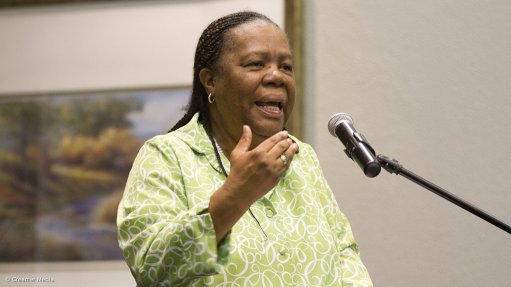
Science and Technology Minister Naledi Pandor
Photo by: Duane Daws
South Africa’s struggling foundry industry on Thursday received a boost as Science and Technology Minister Naledi Pandor unveiled the new casting simulation network aimed at improving small, medium-sized and microenterprises’ (SMMEs') localisation capabilities.
Launched at the Vaal University of Technology’s (VUT’s) Southern Gauteng Science and Technology Park, in Vanderbijlpark, the R6.3-million network enabled smaller companies to map out all design and development flaws of a product during the casting manufacturing process prior to – or even during – mass production.
“Simulation software improves and confirms casting processes and tools, providing the South African foundry sector with advanced technology to equip it in its role to provide vital inputs to the South African manufacturing industry,” Pandor explained, pointing out that localisation efforts were hampered as few local SMMEs had access to the type of simulation software and skills required.
The simulation software services and skills, under the umbrella of the Department of Science and Technology’s (DST's) Technology Localisation Implementation Unit (TLIU), would be made available to SMMEs within the foundries industry from the VUT hub, as well as satellite offices at Stellenbosch University, Durban University of Technology, Nelson Mandela Metropolitan University, Cape Peninsula University of Technology and University of Johannesburg.
The simulation software, funded through TLIU’s sector-wide technology assistance package, allowed for the reduction of preproduction costs, sampling waste, energy use and time during the casting manufacturing process.
This emerged as the DST worked to identify the technology gaps that needed to be plugged to enable foundry companies to be more competitive, as government aimed to reverse the decline that had resulted in the closure of more than 100 foundry-focused companies within the past five years.
Other initiatives spearheaded by TLIU and the DST included the technology assistance programme (TAP), which, since its inception in 2012, had led to the creation of nearly 190 direct jobs, assisted over 140 companies, resulted in the creation of 14 new products and enabled import substitutions for 20 companies, as well as developed the export capabilities of 16 companies and improved South African companies’ capabilities, with 35 and 47 companies respectively securing or improving contracts on projects led by State-owned companies, said TLIU manager Ashley Bhugwandin.
The DST aimed to provide another R320-million over the next three years for technology support and to assist companies under the TAP.
“We do not have all the expertise in South Africa, but we can provide support … [and] upgrade, develop and improve [companies’] capabilities to participate [in local and international projects],” Pandor concluded.